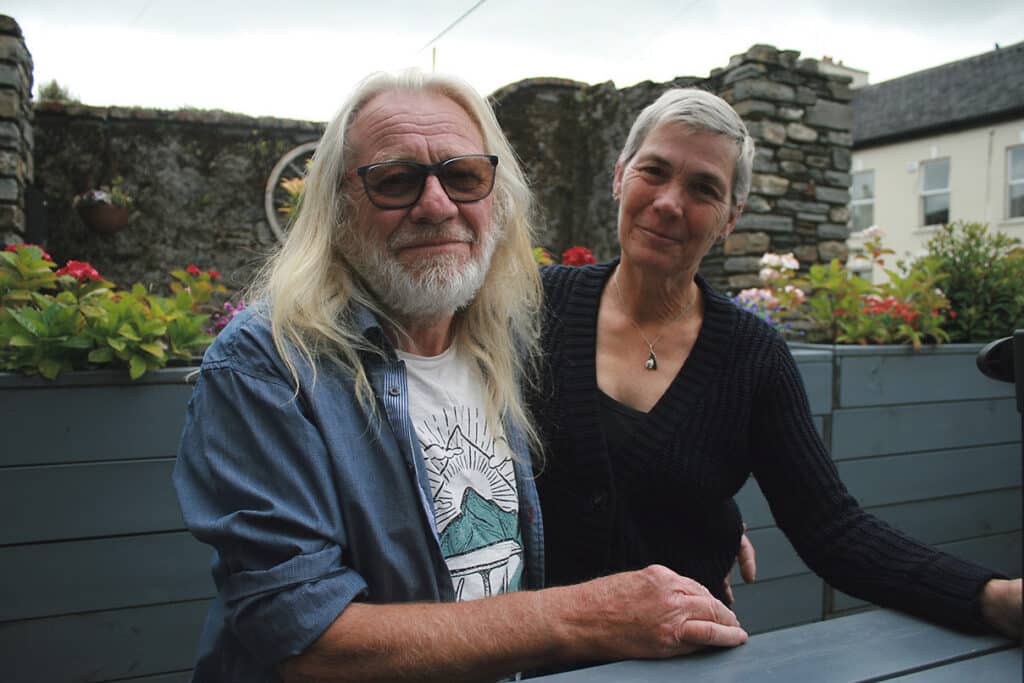Dave and Tina Louks have never looked back since they were given their first foster care placement in 1996. Over the past 27 years, despite the challenges thrown at them by life and the system, the couple have opened up their home and their hearts to a steady stream of children in need of foster care. With 5,597 children in care in Ireland at the end of January 2023 and Tusla reporting that there are currently approximately the same amount of foster carers leaving as entering fostering care, the role that foster carers like Tina and Dave play is more important than ever in a system that’s struggling. Today living high up in the hills of Inchigeelagh, on 15 acres of land with rivers running through and animals roaming freely – you’re as likely to see a deer from the window as find a chicken in the dishwasher – Dave, 73 and Tina, 62, share with Mary O’Brien why they continue to welcome children in the foster care system into their family.

Tiny in stature, for what she lacks in height, Tina Louks more than makes up for in personality, which is warm and engaging. Dave, possibly best known affectionately by many as ‘Chicken Dave’ from his years selling free range chickens in Clonakilty and Skibbereen markets, is friendly and good-natured, with a mischievous twinkle in his eye. The couple, who have been happily married for 41 years share a sense of humour and fun, traits that must be appreciated by the foster children placed in their care.
Tina had served three years in the British Army when she met Dave, a reluctant dairy farmer. In the decade after meeting and falling in love, the couple had four children and, in the early nineties, after a brief holiday in Baltimore to visit friends, they decided to make the move to West Cork permanent with their children, age four, six, eight and 10.
Arriving in Ireland in an estate car with four children, 1500 pounds sterling, two cockatiels and a present of a bottle of whiskey under the seat, the Louks family didn’t have much besides the certainty that West Cork offered them the lifestyle they were searching for. A friend brought the rest of their belongings over in a horse box! “We had no idea what we were going to do but we were certainly loving life,” shares Dave.
While in the UK, Tina had been childminding for a social worker who had advised them that they’d make excellent foster parents.
With this in mind, they started the fostering assessment process straight away in Ireland and after six weeks of training received their first placement.
Their daughter, Rachel, now 23, has been with them since she was just five weeks old, in what was supposed to be a short respite placement. Rachel recently legally changed her surname to Louks.
“We sat down with our kids and talked everything through with them before we went ahead with fostering,” says Tina. “I think that’s essential if you’re considering becoming a foster family. As our children have grown they have reassured us that we did the right thing in fostering and that the effect it had on them was a good one. They’re all in their thirties now and one is a qualified social worker and another works with the Cope Foundation.”
While the narrative is often negative in the media in relation to the foster care system – not every child has a social care worker and not every foster care family has a link social worker (16 per cent of children were without an allocated social worker at the end of January, although Tusla are working to mitigate this) – Dave and Tina stress that their experience in 27 years of fostering has been for the most part overwhelmingly positive.
“You’re only as good as the team behind you and we’ve been very lucky with the support we’ve had,” they share. “We have a fabulous link social worker,” adds Tina. “The workload is huge and it takes a really special person to do the job.”
Of course there are challenges but there is also support.
Child-centred and rights-based, The Irish Foster Care Association (IFCA) provides information, support and learning opportunities for all those involved in foster care.
The organisation also promotes the development of positive change for children in alternative care and influences policy, legislation and opinion through its Advocacy work.
Bridget McDonagh is a Membership and Volunteer Manager with IFCA. A qualified social worker with over 30 years experience working in the area of children and family. Bridget says that “Foster carers and their families often make a lifelong commitment, making a very valuable and significant contribution to the lives of children in care.”
IFCA is currently lobbying for a number of necessary changes for foster carers.
“Foster carers who give up employment to be available to care for children lose out on contributions towards the states non-contributory pension,” shares Bridget.
“The allowance given to support the cost of caring for children in foster care has remained static since 2009 when at that time it was increased by just €6.”
The foster care allowance is currently €325 per week for a child under 12 and €352 per week for a child of twelve and over.
“Foster carers are currently excluded from applying under the Back to School Allowance and receive no mileage allowance for the first 150km travelled.”
“It can be the case that children who enter care do so with very few belongings.
“As a society we should be applauding and thanking foster carers,” she says passionately. “The continuum of care does not end at 18. For the vast majority it will go well beyond their 18th birthdays. Foster carers deserve recognition and respect. Give them the money they need to care for these children because without foster carers, there is no foster care system.”
“It’s not easy,” says Tina. “But we know our limitations and we look after ourselves. From 8.30pm on in the evenings is our time.” Tina enjoys crafting and jigsaw puzzles and Dave loses himself in his woodworking workshop. They both enjoy live music and getting out together to see a gig occasionally.
“Of course there have been times when I’ve sat with a link worker sobbing my heart out saying I can’t do this anymore, and yet we’re still at it!” she shares.
“Even if it’s just half a dozen kids that we can see thriving now, that’s what keeps us going.”
The couple are still in contact with many of the children they have cared for over the years “One lad, now in his mid-30s, comes to visit us with his own kids. It’s worth doing it just for that alone,” says Dave.
“One boy who had been with us for over a year left in April for the aftercare service. It took him a while to settle in but he really progressed in the time he was with us. We got together with him just last week.”
“I was delighted when he phoned me up recently to ask how to make a chicken curry. We’re very proud of him and how well he’s doing now,” says Tina
How do they do it. “We work as a team,” says Tina. “While we might not always agree, we are always a united front.”
“There are a range of reasons that children come into care and, as a foster carer, your role is to support them, nurture them and accept them into your home as part of your family.”
“It takes a long time for some kids to trust you so you have to give them consistency and stay calm at all times,” says Dave.
“We love doing what we’re doing and, for as long as we’re able, we want to continue to help these kids be the best they can be.”
“It can be a difficult role to do and, while there is no doubt that the system has its challenges and there needs to be change, foster carers say that what you get back from the children in your care makes the difficult times easier and enhances their lives greatly,” says Bridget.
The assessment process in becoming a foster carer can take from six months upwards.
All foster carers can join IFCA, in fact anybody can join IFCA and the first year of membership is free. You can join IFCA online at www.ifca.ie or by ringing their office at 01-4599474.
IFCA support workers are available on the phone and email five days a week from 11am – 3pm (01 458 5123 / support@ifca.ie). The service is confidential, responsive, and personal. All IFCA support volunteers have completed a Certificate in Counselling and Psychotherapeutic Skills and Practice course.
IFCA continues to advocate for fair and adequate funding for foster carers, ensuring that the invaluable work foster carers do is recognised and supported appropriately by the state.



